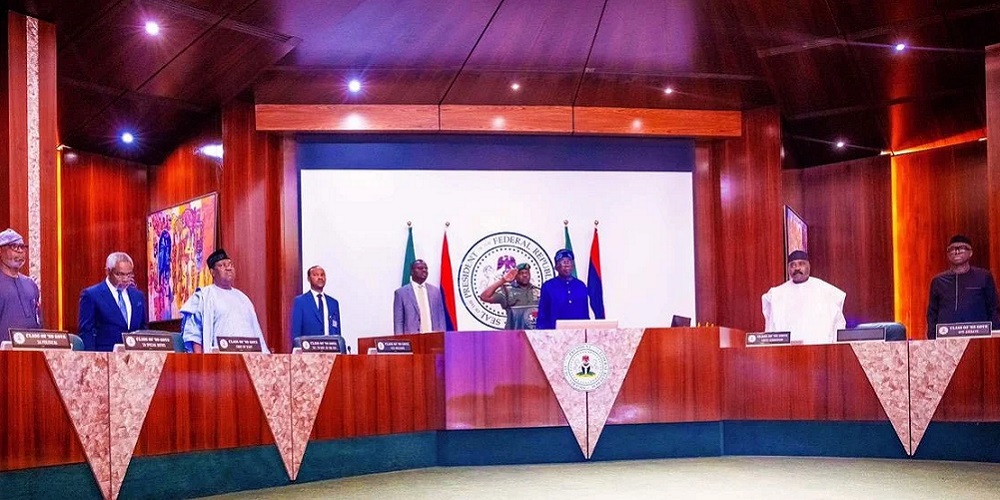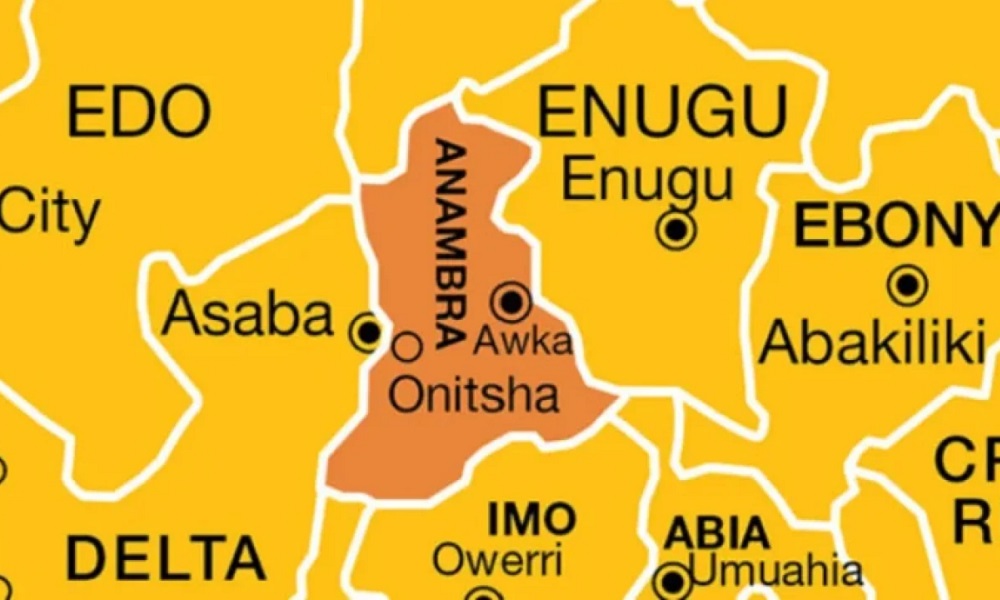News
FEC Approves N4.2trn for Lagos-Calabar Coastal Road, Other Major Road Projects Nationwide

The federal government has approved road infrastructure contracts worth N4.2 trillion, covering major highways and bridges across Nigeria, including the second phase of the Lagos-Calabar Coastal Road. Minister of Works, Senator David Umahi, disclosed this to newsmen yesterday in Abuja at the end of the Federal Executive Council (FEC) meeting presided by President Bola Tinubu.
According to Umahi, the projects are spread over several states, with a focus on enhancing connectivity, improving road safety, and supporting economic growth.
FEC also approved road construction projects worth N159.5 billion for the Federal Capital Territory (FCT), targeting infrastructure development within the city and its satellite towns.
Minister of State for the FCT, Mariya Mahmoud Bunkure, disclosed the approvals during the post-FEC media briefing, where she detailed the major projects aimed at improving accessibility and urban development.
The federal government equally unveiled an ambitious plan to position the country’s creative and tourism sectors as key drivers of economic growth, with the potential to contribute at least $100 billion to the nation’s Gross Domestic Product (GDP) and creating two million jobs. Minister of Art, Culture, Tourism, and Creative Economy, Hannatu Musawa, made this known to newsmen yesterday after the FEC meeting.
The contracts for the nationwide road infrastructure included new constructions, rehabilitation of deteriorating sections, and expansion of critical routes, with many projects shifting towards concrete pavement for durability.
The largest allocation went to the Lagos-Calabar Coastal Highway, with FEC approving N1.334 trillion for the construction of a 130-kilometre dual carriageway. This covers 65 kilometres in Lagos and Ogun states, and an additional stretch starting from Calabar through Akwa Ibom.
The project will be executed under an Engineering, Procurement, and Construction (EPC) framework, with a 10-year maintenance plan.
FEC also approved N470.9 billion for the Delta State access road and N148 billion for the Anambra State access road to the Second Niger Bridge.
According to the minister, both roads will be constructed using concrete to ensure long-term resilience.
He explained, “Lagos-Ibadan Expressway (Phase 2, Section 1) got N195 billion approval to undergo reconstruction under the Presidential Infrastructure Development Fund (PIDF), focusing on improving traffic flow and reducing congestion along the busy corridor.
“The Abuja-Kano road project, previously handled by Julius Berger, has been restructured into two lots following contract termination, including Lot 1 (FCT-Niger boundary): Expanded by 5.71 kilometres towards Kogi State and Lot 3 (Kano section): extended by 17 kilometres.”
Umahi said the total length of the project was now 118 kilometres, with solar street lighting planned throughout. Section 1 will be built with concrete, while Section 3 will use asphalt.
The reconstruction of three sections of the Lokoja-Benin road will be done entirely with concrete for durability at N305 billion, including Obajana to Benin (Section I): N64 billion; Auchi to Edo (Section II): N110 billion; and Benin Airport area (Section III): N131 billion.
A contract worth N3.571 billion was approved for an extensive structural assessment of the Third Mainland Bridge and Carter Bridge in Lagos. Umahi said this evaluation aimed to prevent further deterioration, building on findings from assessments conducted in 2009 and 2013, which identified progressive structural decay.
FEC also approved Ado-Ekiti–Igede Road Project (N5.4 billion) as part of a series of smaller road upgrades in Ekiti State to improve local connectivity and reduce travel time.
It approved N22 billion for the Onitsha-Owerri Expressway. The minister said the expressway will undergo rehabilitation to ease movement between Anambra and Imo states, and foster trade within the South-east region.
Musasa-Jos Route (Kaduna State) was approved at N18 billion to enhance road safety and reduce travel time between Kaduna and Plateau states.
Abia and Enugu States Road Project got N12.75 billion in a joint project that will focus on key sections within the budget limits, and address long-standing infrastructure gaps.
Umahi emphasised that most new projects, including the Lokoja-Benin and Abuja-Kano roads, will be constructed using reinforced concrete pavement instead of traditional asphalt.
He said, “Concrete roads are not only more durable but also cost-effective in the long run. In fact, the cost of these concrete projects is significantly cheaper than previous asphalt-based contracts rejected by some contractors.”
The minister addressed concerns about terminated contracts, particularly with Julius Berger, clarifying that the government has negotiated cost-saving measures while equipment from previous contractors will be repurposed to avoid unnecessary mobilisation costs.
Umahi also dismissed recent reports about fake companies being awarded contracts, and assured Nigerians that due diligence was followed in selecting credible contractors.
According to him, “We’ve resolved misunderstandings with key stakeholders, including media organisations, to ensure transparency. The companies handling these projects are legitimate and well-equipped.
“This is not just about roads; it’s about driving Nigeria’s economic transformation. We are committed to delivering durable, cost-effective infrastructure that will stand the test of time.”
FEC also approved road projects worth N159.5 billion for the FCT, focussing on infrastructure development within Abuja and its satellite towns.
The FCT minister of state detailed the five major projects aimed at improving accessibility and urban development during the post-FEC media briefing.
She said the projects included Bus Terminal Access Road, Mabushi, awarded to Messrs SETRACO Nigeria Limited at the cost of N30.97 billion, with a completion period of 18 months.
The council approved Arterial Road from Wuye District to Ring Road II, awarded to Messrs Arab Contractors Nigeria Limited at the cost of N62.5 billion, with a completion period of 20 months.
Bunkure stated, “Also approved is Kuje-Gwagwalada Dual Carriageway Construction to Messrs Gilmor Engineering Nigeria Limited at N7.49 billion; the rehabilitation of Old Keffi Road (Kado Village to Dei Dei), awarded to
Messrs Lubric Construction Company Limited at N26.87 billion, with a completion time of 18 months.
“There is also a contract for the construction of access road to Renewed Hope Cities and Estates (Kasana West District) to Messrs Lubric Construction Nigeria Limited in the sum of N31.66 billion, with a completion time of 18 months.”
The minister emphasised that the projects aligned with the FCT administration’s commitment to urban expansion, improved road networks, and enhanced connectivity across Abuja.
She said the contracts were awarded to reputable construction firms with track records of delivering quality infrastructure projects.
Bunkure assured residents that the projects would be completed within the stipulated timelines to enhance mobility and economic development in the capital city.
Equally on Monday, the federal government unveiled a plan to position Nigeria’s creative and tourism sectors as key drivers of economic growth, with the potential to contribute at least $100 billion to GDP and create over two million jobs.
The art, culture, tourism, and creative economy minister told the post-FEC media briefing that at the heart of the plan was the establishment of Creative and Tourism Infrastructure Corporation (CTIC), a special-purpose vehicle designed to invest in and develop critical infrastructure for Nigeria’s creative and tourism industries.
The initiative, approved by the FEC, will operate under a public-private partnership (PPP) framework, and attract both local and international investors to support its ambitious goals.
“The CTIC is not just a project; it’s a transformative agenda,” Musawa stated.
“We aim to unlock the immense potential of Nigeria’s creative and tourism industries, enhance economic growth, and project Nigeria’s cultural soft power globally,” she added.
The minister outlined the government’s targets for the CTIC to include: contributing at least $100 billion to Nigeria’s GDP; creating over two million jobs, with a focus on Nigeria’s vibrant youth population; and developing world-class infrastructure to support talent development, cultural preservation, and tourism growth
“This is a deliberate strategy by President Bola Tinubu’s administration to diversify the economy beyond oil and tap into Nigeria’s vast creative and cultural wealth,” Musawa said.
The minister emphasised that while Nigeria boasted a wealth of creative talent and cultural heritage, lack of supporting infrastructure had been a major barrier to full realisation of the sector’s economic potential.
Musawa said, “Everyone talks about Nigeria’s creativity. Our content is globally celebrated, from Nollywood to Afrobeat. But what we lack is the infrastructure to support and sustain this growth.”
She stressed, “Imagine the impact if events, like December’s ‘Detty December’ in Lagos, were backed by world-class infrastructure. The value would be exponential.”
Musawa revealed an array of projects under consideration to drive the sector’s growth, including: Abuja Resort Range and Abuja Creative City; revitalisation of Yankari Game Reserve; development of 5,000 new cinema screens nationwide; Wole Soyinka Centre for African Arts in Lagos; and a National Digital Distribution Network for creative content.
Others were upgrading the National Gallery of Art and expanding the National Arena to 100,000-seat capacity; establishment of a Nigerian National Museum in Abuja; positioning Nollywood as a global film destination with dedicated production hubs; and a world-class music arena to support Nigeria’s booming music industry.
“It’s unthinkable that Nigeria, the Giant of Africa, doesn’t have a national museum in its capital city. We’re going to change that,” Musawa declared.
She also highlighted ongoing engagements with development partners and stakeholders worldwide to secure investments and adopt innovative financing models for the CTIC projects.
Musawa explained, “The government is intentional about this. We’re not just waiting for foreign investments; we’re putting domestic financing structures in place and creating an environment where the private sector can thrive.
“Today marks the beginning of a journey to not just build infrastructure, but to shift the national mind-set about the economic power of culture, creativity, and tourism.”
The minister added, “This is a new dawn for Nigeria’s creative and tourism industries.”
News
Anambra takes action against primary school over N5,000 prefect nomination fee

The Anambra State Government has slammed a one-month sanction on Blossom Fount School, Awka, for monetising student leadership by charging pupils N5,000 to contest for the position of head prefect.
The sanction, announced on Saturday by the state Commissioner for Education, Prof. Ngozi Chuma-Udeh follows reports that the school imposed the controversial fee on pupils in its primary section vying for leadership roles.
Describing the practice as “despicable,” Chuma-Udeh expressed outrage at what she called an attempt to commercialise student leadership and exploit the ambitions of young children.
She said, “Investigation is going on to know how the school is being run. It is an act of selling the psyche of the children to the highest bidder from the cradle, and it is not acceptable to this government.”
“The act of commercialising student leadership and exploiting children’s ambitions for financial gain is despicable. It amounts to selling the psyche of the children to the highest bidder from the cradle, and it is strongly condemned,” she added.
Chuma-Udeh stressed that Governor Chukwuma Soludo’s administration remains committed to upholding integrity and fairness within the education system, stating that such practices will not be tolerated.
According to reliable sources, the ministry’s investigation is still ongoing, and further sanctions may be imposed depending on the outcome. The goal, officials say, is to ensure accountability and deter similar actions in schools across the state.
News
NELFUND: ICPC deepens probe on loan fraud

The Independent Corrupt Practices and Other Related Offences Commission has continued its probe into the alleged discrepancies in the disbursement of funds under the Federal Government’s student loan scheme, Sunday PUNCH has learnt.
This comes amid repeated denials from the Nigerian Education Loan Fund that no money was missing in the student loan scheme.
Sources within the anti-graft agency told our correspondent that the investigation began after NELFUND sent a request, asking the agency to track the disbursed funds, after the National Orientation Agency raised the alarm that some schools were cheating the students on the loans disbursed to them.
One of the sources, an official of the agency who spoke anonymously because of the sensitivity of the matter, however, said no one had been indicted yet.
“We have just started the investigation. It was NELFUND that brought the matter to us to help them track where the money might have gone. We’ve not indicted anyone, but the allegation is still there,” the official said.
According to the source, preliminary findings revealed that N100bn was earmarked for the programme, but N28.8bn was disbursed to students.
Another source said further investigation had, however, shown that N203.8bn was received, out of which N44bn was disbursed.
“So far, we have not indicted anybody. They have disbursed N44bn. But when we get the recipients, we will find out if they did receive that amount. If they received the said amount, we will now find out where the discrepancy came from,” the senior official said.
The source urged Nigerians to remain patient and avoid insinuations, adding that the agency would disclose its findings once the investigation was complete.
“Nigerians should be patient with us and let us do our work. There is no need for insinuations. We are getting to the root of this. If the amount of N44bn has been received by the recipients, then there won’t be any problem. And if there are discrepancies, we will unearth them and disclose them to Nigerians,” the source said.
“If there are discrepancies, we will unearth them,” another source added.
NELFUND, on its part, has continued to dismiss the allegations of misappropriation as “entirely false and deeply damaging.”
In a statement issued on May 1, the Fund’s Director of Strategic Communications, Mrs. Oseyemi Oluwatuyi, stated that “the integrity of an institution established to deliver financial hope to millions of Nigerians must not be undermined by unverified claims.”
Managing Director of the Fund, Akintunde Sawyerr, also maintained this position during an appearance on Channels Television on May 4.
He confirmed that the Fund had actually received about N203bn, broken down as N10bn from the Ministry of Finance, N50bn from the EFCC’s proceeds of crime, and N143bn from TETFund.
He said, “The Nigerian Education Loan Fund has received about N203bn. I’ll break it down for you: N10bn from the Office of the Minister of Finance through the Office of the Accountant General, N50bn from the EFCC’s proceeds of crime, and N143bn from TETFund. So you can see already that the actual amount received is in excess of what’s even been said to have been received.
“Out of that, N54bn has been disbursed to date, while N30bn and N24bn had gone to institutions and for upkeep respectively. So there’s a pocket money side to this. That’s N54bn disbursed already in the space of about 11 and a half months. It’s in the Central Bank of Nigeria.”
Sawyerr reiterated this stance when he appeared before the House of Representatives Committee on Students Loan, Scholarship, and Higher Education on May 8, firmly stating that no funds were missing.
The controversy first gained traction in April following a National Orientation Agency investigation, which uncovered claims that some tertiary institutions, in collaboration with banks, were withholding student loan disbursements.
Efforts to reach ICPC’s spokesperson, Demola Bakare, proved abortive.
News
15 pipeline vandals convicted in Niger Delta, says Ribadu

No fewer than 15 pipeline vandals across the Niger Delta region have been convicted, while 100 others are being prosecuted.
The National Security Adviser, Nuhu Ribadu, disclosed this on Friday at a town hall meeting organised by Petroleum Infrastructure Nigeria Limited, a pipeline surveillance contractor, in Yenagoa, Bayelsa State.
Ribadu, who was represented by his Special Assistant on Energy, Security and Finance, Amakiri Harry-Young, said his office was working assiduously to protect crude oil infrastructure in the Niger Delta region.
He said those convicted were being held at the Port Harcourt Custodial Centre.
The NSA revealed that a special committee comprising investigative and prosecuting teams had been working round the clock to ensure that pipeline vandals and other offenders face justice.
According to him, the move followed concerns raised during a previous meeting about the arrest and quick release of oil vandals, which often led to further insecurity in the affected communities.
“The President is serious about the 2.5 million barrels, and we are doing everything necessary to reach that goal,” he said.
He added that success would depend on the collective efforts of all stakeholders involved, as the Federal Government was taking strong action against pipeline vandals who threatened national assets and local communities.
In his opening address, the PINL Consultant on Community Relations, Dr Akpos Mezeh, said the firm had recorded major successes in safeguarding the Trans-Niger Pipeline through close collaboration with host communities, security agencies, and other key stakeholders.
Mezeh also stated that PINL had helped reduce crude oil theft and pipeline vandalism to near-zero infractions on the pipeline by investing in community needs, resolving disputes, and restoring the environment.
He pointed out that PINL had also improved crude oil production and restored greater investor confidence, thereby contributing to an increase in national revenue.
The President of the Ijaw National Congress, Prof Benjamin Okaba, stressed that Ijaw communities had always supported Nigeria’s unity and economic stability and also taken the lead in the management of pipelines through companies like PINL.
Okaba called on communities to fully support PINL’s operations, stressing that any success recorded in protecting pipelines was also a credit to the Ijaw people.
-

 News14 hours ago
News14 hours agoTrouble brewing as Trump’s supporters move against Pope Leo, give reason
-

 News16 hours ago
News16 hours agoHow doctor stole one of my twins during birth, Abuja housewife narrates nasty experience
-

 News16 hours ago
News16 hours agoNaira Rebounces Against Dollar – Saturday, May 10, 2025
-

 News21 hours ago
News21 hours agoDefections: It’s a massive betrayal against NNPP -Kwankwaso cries out
-

 Education23 hours ago
Education23 hours agoTeenage girl drag JAMB to court over alleged hijab ban during UTME
-

 News14 hours ago
News14 hours agoChina Responds to AFN Claims Over Visa Delays for World Relays in Guangzhou
-

 Education20 hours ago
Education20 hours agoWhy JAMB is withholding 39,834 UTME results
-

 News14 hours ago
News14 hours agoReflections of Hon. EJ Agbonayima on Nation Building


















